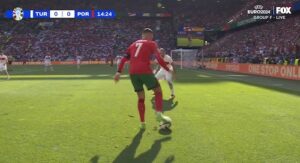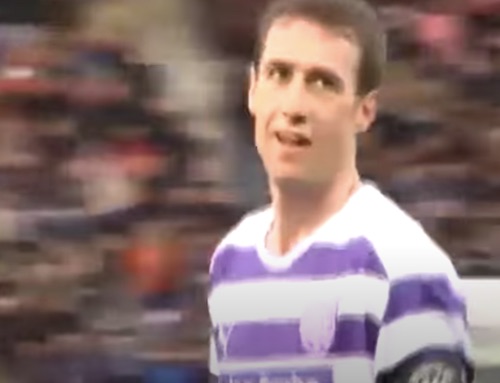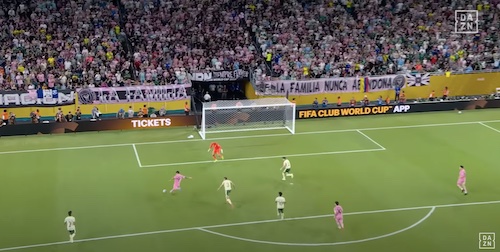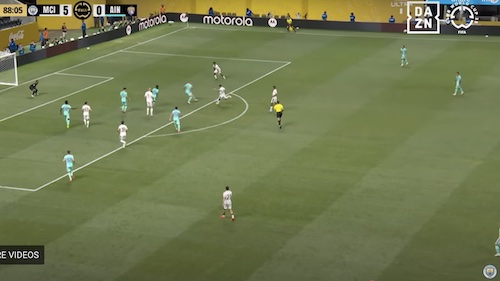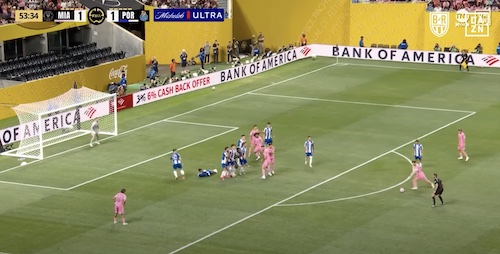By Tom Simpson
The Abschiedsspiel or Testimonial Football Match
History was made on March 28th, 2009. Joe Enochs became the first American soccer player to be honored in Europe for his career contribution to the game. In his honor, Osnabruck VFL, a Bundesliga 2 team, staged an Abschiedsspiel for Joe. It is a farewell game. Some call it a“Testimonial Match.” It is reserved for the very few honoring a football player’s contribution to his team. Maybe you haven’t heard of Joe Enochs.
When the soccer world thinks of American tenure in European soccer, names like Brad Friedel and Casey Keller surface immediately. Who among the readers would associate the name of Joe Enochs with the highest honors of European club soccer (they call it “football”)? I venture to say, it is the rare student of sport who knows the answer to soccer trivia when that question is asked. But it will be the name of Joe Enochs that surfaces when the history of the sport is written in years to come and trivia buffs battle wits.
Joe enters the stadium with his daughters Emily and Sophie.
Joe Enochs had a humble start, indeed. In 1987 he came to a Seals youth team training session. We were then called the San Francisco United Soccer club. He was a young kid from Petaluma and Kimtai, my son, said that he really liked Joe. Could we give him a shot? He wanted Joe to play for our youth team and join us on our European tour for the Summer of 1987.
In those days, Joe was all about enthusiasm and work rate. And Joe had, from the first day, what only one-in-a-hundred, maybe a thousand, has. Joe turned every 50:50 ball into a “no contest.” I mean, he never lost the challenge. And you know, even today, in a locker room filled with Joe’s honored guests, a variety of players from the Bundesliga and a good number of national teams, they still say the same thing: “I hate playing against Joe Enochs.” And those pros who play with him say, “I hate playing without Joe Enochs. We’re all going to have to work that much harder.”
The Summer of 1987 was a whirlwind tour that took us to Helsinki, Finland, Gothenberg, Sweden, Horring, Denmark and Oslo, Norway. We won 16 matches and lost only four. Each of the four losses was a knock out match in the playoffs of the four competitions. But that was news enough! An unknown American team from a land of baseball and basketball was winning games regularly in European competition. We were the upstart American kids, the nobodies from a land where nobody ever came: San Francisco. Yes, San Francisco was then and pretty much continues to be the city that rarely produces a soccer player whose name is much more than a local high school star.
Attending Joe’s Farewell game in Germany were two friends who played with Joe in that very special summer of soccer: Rob Bonta, a SF City Attorney who was an All England player at Yale Univeristy and a professional for the San Francisco Seals, and Mike McGinty, a college standout goalkeeper at Wake Forest, who went on to play for DC United of the MLS.
When the reminiscing began the night of Joe’s testimonial match, we all went to that Summer of 1987 and, in particular, a game against Barcelona. Mike said he wished he knew who played for Barcelona that day. How many of those guys went on to become major stars in La Liga? We’ll never know. But we remember the game well.
It was played in Gothenberg on Heden field, an all dirt ground, in the middle of a giant complex of fields. But for one brief period of time, it was turned into one of the highlight matches of the Gothia Cup, one of the largest international youth tournaments in the world. The unknown and undefeated team from San Francisco squared off against the professional powerhouse of Spain. David meets Goliath! It’s everyone’s favorite story. And the newspapers loved it.
They filled the sports page the next day with highlight shots of the match and the 3,000 plus fans who crowded round to witness a game that was legendary before it started. The sports reporters filled the papers with comments about Americans who played like demons, some said like “American footballers” to be pejorative (because American success in soccer on European soil was anathema), but most were in admiration of a team Barcelona couldn’t score against.
Two of Joe’s team-mates from his 1987 Seals youth team: Rob Bonta, in black, on left and Mike McGinty, to his right. Rob is the City Attorney for San Francisco and Mike Coaches at the University of Virginia. Both played in the match.
Joe with the representative of a large fan club.
What surprised them more were the moments when Barcelona almost gave up a goal, in a game which would have knocked them out of the tournament, sending them home packing to explain how some never-heard-of-before team from San Francisco beat them on European soil.
What ignominy! Why should they ever get another penny to play the game? And if there was one player who played that day and represented what that match meant to all of us, it would be the player on whom Europe would ultimately bestow a club’s highest honor: the Abschiedsspiel of Germany,the Testimonial Match.
Osnabruck football team is over 100 years old. During that one hundred years, the vast majority of the time was spent in the Bundesliga. It’s a small city, roughly 100,000 strong, but it’s a proud city and they adore their footballers. I was born months after American bombers leveled this town to rubble. It doesn’t seem long ago that hate and anger separated Americans and Germans in a way that makes this story seems so improbable that it might have sounded like a nightmare to the average citizen of Osnabruck.
At the East end of the stadium, fans reach through the wire fence for a final farewell. Joe’s daughters look on.
Yet, Joe Enochs, an American, is among the most revered Osnabruck players of all time. How could this unlikely story ever get told? After his early career with the Seals that lasted from 1987 to 1993, Joe did what so many think about, but few achieve: playing professional soccer in the Big Show of the world, European professional football.
This photo doesn’t do the moment justice. Joe has climbed to the top of the fence to wave good-bye to the hardest of the hard core fans who fill the area behind the Western goal. You can only imagine the grief and tears on their faces as they say goodbye to their favorite player.
There was no MLS at that time. All previous attempts at professional soccer in the States had been miserable failures. All the deep pockets who had supported the game were empty. There were only hopes for the future, but they hinged on a successful World Cup. But who could count on that? And why wait? Joe headed for Europe and found himself a spot on a lower division team in the St. Pauli organization that paid him enough to carbo-load on German pastry and pay for a broom-closet sized bedroom.
That was all he needed. Within three years, the player who led the San Francisco Seals youth team, then called San Francisco United Soccer Club, nicknamed “SFUSC,” on exploits that led to wins over Nacional, the U18 Brazilian National Champions in 1989 in Brazil, the USA Cup Championship in 1990, the State, Regional and National Championship USYSA matches in 1990, was ready for primetime in Europe. Hamburg’s St. Pauli offered him a contract on their Bundesliga 1 team and Osnabruck, who recently dropped from the Bundesliga to the Regionaliga, offered him less money, but more opportunity to play.
Joe wisely took the opportunity to play instead of sitting on the bench as a well-paid apprentice for Hamburg. Today, Joe Enochs has played more games for Osnabruck than any other player in the history of the club. He recently knocked Uva Brunn off the record books. Uva is the most highly honored and famed Osnabruck goalkeeper and second of the three players to ever receive the abschiedsspiel honors. Ah, you wonder, so what’s the big deal? What’s the hoopla! Why should we get excited! Why mention this, write about it, try to give it attention?
L to R: Joe’s mom, Bea, his wife Gunilla, his daughter Sophie and her older sister Emily.
Joe and Uva Brunn, the last player ever honored by the Absheidsspiel. Joe and Uva are two of only three players ever honored by the century old football club.
I would guess that to the American reader, even if a fan of soccer, these honors and notices just don’t seem to warrant press time. Isn’t there something else to write about? Isn’t there something else worth spending one’s time on? Well, certainly there are? We’re in the middle of a global economic crisis. Although stateside, the pundits are poo-pooing the idea of a depression, there are European economists who think it’s still on the table. There are troubles in the mid-East that put Joe’s story on the super-trivia list. What do the successes and honors of a Joe Enochs mean in the grand scheme of things? Look at the chilling poverty of Africa and so many other nations! Look at the looming and ominous HIV statistics that have killed nearly 40 million people, mostly on the African continent. Dare I not mention Global Warming!
We, the world, have big problems. And we need to devote our time and energy to tackle these issues. But every now and then, we want a break, too! I do! Although I’m a soccer guy, I spend more of my life worrying, thinking and grappling with the “real” issues of the world. I even have a “real” profession as a medical doctor when I’m not hobnobbing with soccer dignitaries in Northwest Germany since Joe named me the “assistant coach” at his Abschiedsspiel.
Joe with two local kids who want their photo taken with Joe Enochs.
The day after the game, a mom brings her son by Joe’s restaurant in downtown Osnabruck to see Joe.
Ultimately, though, I don’t see this as just a soccer story or relevant simply because it has historical value. I never have seen soccer as just a sport. As the abschiedsspiel game was winding to a close, the fans across the stadium began to cry, one side answering the call of the other. Joe AY-nochs (we say “ee” as in “see” while they prefer the “a” in “hay) shouted the thousands on one side. “Joe-Enochs” cried the thousands on the other. It went on and on, back and forth, as if they wanted their echoing banter to have a life of its own. They never stopped, even when the game was over.
And then the whistle blew, you couldn’t even hear it, and all the players on the field began to step up to Joe, one by one, guys from Macedonia, Africa, the United States, Brazil, and, of course, the German guys who were in the majority. They all gave Joe a good-bye hug and a thank you. And the tears flowed…the fans cried, coaches, staff, players, family and friends…..and Joe cried, too. He had finished what he set out to do. He made a place for himself in the world in the most unusual of places for an American. An American soccer player was honored as the best among his peers in a sport that he had no business being part of.
Yes, this is what it’s about! It’s about the dream within each of us. We all want something that says “I belong here,” “I’ve set a goal for myself and I want to achieve it,” “I want to make something of myself to show myself, to show my family, to show others that I, too, can make a mark in this world.” Some are fortunate enough to get that recognition from the outside world, some like Joe Enochs. And it’s important for us to honor the best among us. Why?
Because it’s important for each of us to recognize the purpose for which we live. Yes, so there’s a message. Do say thank you to that person in your life who made a difference, like the fans thanked Joe for giving his all for them. Provide honor to that person for setting a standard so high that almost no one will ever reach it. Joe probably set higher standards for himself than what he achieved. Perhaps he would have wanted a contract with Bayern Munich and more games with the US National Team.
Joe Enochs and Tom Simpson, author, 1987, Gothia Cup, Gothenburg, Sweden.
But that issue misses the point. We do the best with what we’ve got. My heart is filled with grief for those children in Darfur who may never see a 2nd, 3rd or 4th birthday, let alone the chance to make a name on one of the great stages in life. This is not about the ego gratification of saying “I did it.” It’s about having the freedom, the support, love and opportunity to try. We celebrate those who achieve not to satisfy their need to feel fulfilled but to honor their achievement, because in doing that we celebrate our own right, purpose, and good fortune to reach for the same.
Thanks Joe
Quick Video from the Game
Tom Simpson is a retired neonatologist and owner/coach of the San Francisco Bay Seals: SFSeals@gmail.com



